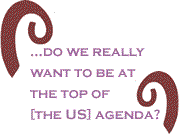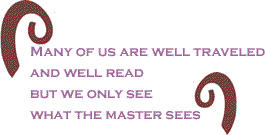
|
||||||||||||||||||||||
 |
||||||||||||||||||||||
 |
||||||||||||||||||||||
 |
||||||||||||||||||||||
 |
||||||||||||||||||||||
 |
||||||||||||||||||||||
 |
| The current issue is always free to everyone |
|
|
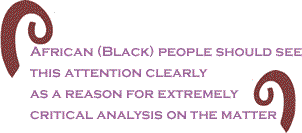 |
Like some BlackCommentator.com commentaries
of the last two weeks, accounts of the situation in The disproportionate attention on Malcolm X warned us that: “If you form the habit of going by what others think about someone, instead of searching that thing out for yourself and seeing for yourself, you will be walking west when you think you’re going east, and you will be walking east when you think you’re going west...you’ll always be maneuvered into a situation where you are never fighting your actual enemies, where you will find yourself fighting your own self.” First let me make it clear that the views and
opinions in this commentary are my own and do not reflect
the position of the Institute for Policy Studies. What about
the facts in this commentary? Well, those speak for themselves.
After sharing some of what follows with a work colleague,
her response to me was “all I hear you saying is that everything
the MDC does is bad and everything Mugabe does is good.” This
was especially baffling since I had not once mentioned Mugabe’s
name in what I had said. I’ve often run into this sort of
thing. It shows that hatred for Robert Mugabe has been stirred
to such rabid levels that any statement even remotely favorable
to him is not judged on merits of veracity but on its political
mileage. It’s not at all politically advantageous within the
Bill Fletcher says, “The Bush administration
is not in a position to lecture anyone on human rights or
genuine elections. This fact, however, should NOT mean that
we remain silent simply because President Bush holds President
Mugabe in distain. The enemy of our enemy is not necessarily
our friend.” While this makes a good disclaimer from the Bush
agenda it also manages to reduce the issue to one of mere
distain between individuals (Bush and Mugabe) versus being
the reflection of a historical Bill insinuates that those of us who say the
primary issue in Malcolm’s statement is too relevant when we
consider that the mission claimed by most Africa Advocacy
organizations is to affect Although when it comes to Zimbabwe many of
these organizations more than fall short on this mission,
never addressing the policy and interests of their own government
toward Zimbabwe and certainly taking no action to change it.
Tellingly I have yet to see from these
For example the bio accompanying Tony Namate’s
cartoons brags that, “ Based on the African experience should we trust
media that is so egregiously wrong on Zimbabwean journalist and filmmaker Olley Maruma demonstrates how…
“On 6 February 2002, The Zimbabwean Independent
carried an article titled, My Ordeal as Mugabe’s Prisoner,
written by Basildon Peta. In the piece, Peta claimed that
“He fled Zimbabwe in disgrace to South Africa only to claim to the sympathetic Western media there that he had been ‘hounded’ out of Zimbabwe by a repressive state for his ‘fearless reporting.’ Thus, a dishonest man, who had been exposed to the world as a shameless liar, was hailed by the Western media as a hero. In no time, he was snapped up by the white South African media for whom he continued to write his false and vituperative stories demonizing the government of the ‘dictator, Robert Mugabe’” [2]. Now let us compare Guinea and Zimbabwe, both countries having a head of state who has been in power since early-mid 80’s; Lansana Conte in Guinea and Robert Mugabe in Zimbabwe. Conte, however became leader through an imperialist backed military coup following the death of the democratically elected, Pan-Africanist President Sekou Ture. Mugabe on the other hand was democratically elected after earning his place as a freedom fighter in the struggle against British settler colonialism. But only Mugabe receives a heavy degree of patent denunciations for being “in power too long”. Not blind idolizing but a point of fact.
However, the brutal and unprovoked attack by Conte, which mind you occurred roughly at the same time, went relatively unnoticed. Advancing on a crowd with tanks, Conte’s forces sprayed a peaceful demonstration of thousands with rapid-fire automatic weapons killing over 60 people and some reports were as high as 200 killed [4]. The same benevolent Western governments and their NGO agents uttered hardly a critical murmur. Nevertheless Ms. Kidane says: “From news sources,
teleconferences and the Zimbabwean Diaspora in the It is naïve not to be skeptical of recent reports that pin blame for all the violence on ZANU-PF given the frequent threats of violence from the MDC and civil society and reports from SADC, the UN and Human Rights Watch that point to violence on both sides. Further, it seems the violence is primarily committed by individuals and small groups taking action on their own, because passions on both sides are inflamed. Why are they inflamed? The West’s proxy provocateurs and sanctions have deliberately brought the situation to a boiling point. Mugabe has publicly scolded supporters of ZANU PF who’ve perpetrated violence, saying on one occasion, May 17 “Such violence is needless and must stop forthwith.” He added, “Support comes from persuasion, not from pugilism. Genuine support for the party cannot come through coercion or violence” [5].
Tendai Biti, the MDC’s Secretary General threatened
Kenya-style electoral violence if Mugabe won this years election
[8]. A glimpse of the handbook being used in all the anti-Mugabe
euphoria is revealed when outspoken Mugabe critic Archbishop
Pius Ncube says “I think it is justified for Britain to raid
Zimbabwe and remove Mugabe…” We should do it ourselves but
there’s too much fear. I’m ready to lead the people, guns
blazing, but the people are not ready.”[9]. Ncube’s solution
for What happens when we apply Malcolm’s insistence
on independent scrutiny to Kidane’s request for contributions
to a solidarity fund? Kidane says the fund is “organized by
civil society organizations in the All the organizations supported by the fund:
Zimbabwe Congress of Trade Unions, Crisis In Zimbabwe Coalition,
and the Zimbabwe National Student Union were members of the
National Constitutional Assembly (NCA), a coalition formed
in 1997, which gave birth to the MDC [10]. We would be remiss
in our analysis if we did not acknowledge that external forces
like
One group the money would go to is the Crisis
in Zimbabwe Coalition, which is already funded by the To illustrate just how non-political and nonpartisan Crisis in Zimbabwe Coalition is, one should know that its chairperson, Arnold Tsunga, is a lawyer for the MDC. Its vice-chairperson, Collin Gwiyo, is a founding member of the MDC [13]. Another recipient of the fund is the Zimbabwe Congress of Trade Unions (ZCTU). Who wouldn’t sympathize with the rights of the working class? But please follow me on this. Kwame Nkrumah warns us that “mechanisms of neo-colonialism” often work through the labor movement. He explains: “In the labor field, for example, imperialism operates through labor arms like the Social Democratic parties of Europe led by the British Labor Party, and through such instruments as the International Confederation of Free Trade Unions (ICFTU), now apparently being superseded by the New York Africa-American Labor Center (AALC) under AFL-CIO chief George Meany and the well-known CIA man in labor’s top echelons, Irving Brown” [14] Philip Agee, former CIA operative and author of Inside the Company: CIA Diary, corroborates this in his thorough paper, Terrorism and Civil Society As Instruments of US Policy In Cuba, when he revealed that:
Thinking for ourselves, I am sure Malcolm would again refer to Nkrumah’s understanding that in Africa it is optimal, revolutionary and Pan-Africanists for African workers to “...link the African workers’ movement organically to the struggle by determining specific intermediary objectives so that whatever progress is achieved in the workers’ struggle will mean progress in the whole anti-imperialist movement, and the promotion of socialism on a continental scale...”[16]. An anti-imperialist character is clearly missing
from the program of the ZCTU and consequently any commitment
to Pan-Africanism. They erroneously define their tasks as
those delineated for them in guides and manuals, training
and so forth given to them by neocolonialist elements. The
fact is that the AFL-CIO, which I have established above has
a history of being used by the CIA, has an international arm
called The Solidarity Center. The To further illustrate how the Readers of Kidane’s appeal commentary are asked
to contribute money to a Zimbabwe Solidarity Fund as if funds
from the
Before ending please indulge me to address
one more piece of misinformation. Kidane says, “When a democratic
space such as this (with all its shortcomings) has been closed
for the millions of Zimbabweans who had eagerly been awaiting
a change in regime…” This seems to echo the media distortion
that the people of The pressures I am referring to are the – rarely, if ever mentioned - sanctions and economic crisis, pirate radio stations and “independent” media funded by the US, Britain and Netherlands to turn popular opinion against the government, and the provision of millions of dollars to civil society groups to oppose the Mugabe government. So to be faced with a sustained program of vilification and regime change methods for nearly a decade and to still win the popular vote, the idea that the majority of Zimbabweans are eager to be free of Mugabe’s government is absurd. In the March 29 presidential round of voting the margin of votes Tsvangirai received over Mugabe was just 4%. Also, ZANU PF won more seats in the senate, an absolute majority within five provinces and a simple majority within one. The MDC, on the other hand won only two provinces with an absolute majority and two with a simple majority.
While the website of Nunu Kidane’s Priority
Africa Network believes “Africa has never been top agenda
to the We’ve established that the recipients of the
Zimbabwe Solidarity Fund really are political opposition.
It should be understood that supporting these organizations
makes one more in common with the As a result of a previous BlackCommentator.com
commentary I wrote, a reader sent me an appreciative email.
After reading Nunu Kidane’s commentary the same reader sent
me the following message, which I share with his permission.
“
In conclusion as we say, there is clearly a
striking double standard between the treatment of other countries
in Africa and END NOTES: http://www.africaaction.org/about/index.php Maruma, Olley, “African Blood Is Cheap” 2002 Gregory Elich, “The Battle Over Zimbabwe’s Future,” Global Research, April 13, 2007: Free Speech Radio News, January 26, 2007 Sunday Mail ( BBC, September 30, 2000 The Guardian, February 20, 2002 The The Sunday Times ( Sithole, Masipula, “Fighting Authoritarianism
in Ibid http://www.ned.org/grants/06programs/grants-africa06.html http://pipl.com/directory/people/Collin/Gwiyo Nkrumah, Kwame, Neo-Colonialism
the Last Stage of Imperialism Agee, Philip, “Terrorism and Civil Society As Instruments of US Policy In Cuba,” Socialism and Democracy (2003): p.10 Nkrumah, Kwame, Handbook
of Revolutionary Warfare: A Guide to the Armed Phase of the
African Revolution. (Little new world paperbacks) http://www.solidaritycenter.org/content.asp?contentid=657 http://www.solidaritycenter.org/content.asp?contentid=409 BlackCommentator.com Guest Commentator, Netfa Freeman, is director of the |
Any BlackCommentator.com article may be re-printed so long as it is re-printed in its entirety and full credit given to the author and www.BlackCommentator.com. If the re-print is on the Internet we additionally request a link back to the original piece on our Website. Your comments are always welcome. eMail
re-print notice
If you send us an eMail message we may publish all or part of it, unless you tell us it is not for publication. You may also request that we withhold your name. Thank you very much for your readership. |
|
| July
10, 2008 Issue 285 |
|
| Executive Editor: Bill Fletcher, Jr. |
| Managing
Editor: |
| Publisher: Peter Gamble |
| Est. April 5, 2002 |
| Printer Friendly Version in resizeable plain text format or pdf format. |
 |
 |
 |
| |
| |





















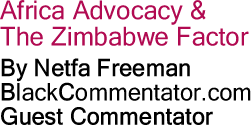
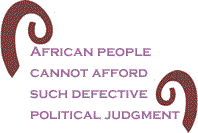 Given
the age-old propaganda ploy of demonizing for dubious political
ends we must be able to distinguish between blind idolizing
and points of fact; between rabid contempt and points of fact.
Is it blind idolizing or acknowledging a fact that a ZANU
PF led government finally corrected the racist land allocation
by redistributing land to over 300,000 indigenous Zimbabwean
families? Is it not a fact that a ZANU PF led government has
formed legislation to give majority ownership of the country’s
mines and enterprises to the Black majority? Is it not a fact
that a ZANU PF led government jettisoned the imperialists’
Economic Structural Adjustment Programs by imposing tariff
restrictions and investment performance requirements, nationalizing
certain business enterprises, and institutionalizing economic
indigenization policies? It is not a fact that imperialism
is actively trying to sabotage all of these things and in
the process raising Mugabe as the poster child for all that
is wrong in
Given
the age-old propaganda ploy of demonizing for dubious political
ends we must be able to distinguish between blind idolizing
and points of fact; between rabid contempt and points of fact.
Is it blind idolizing or acknowledging a fact that a ZANU
PF led government finally corrected the racist land allocation
by redistributing land to over 300,000 indigenous Zimbabwean
families? Is it not a fact that a ZANU PF led government has
formed legislation to give majority ownership of the country’s
mines and enterprises to the Black majority? Is it not a fact
that a ZANU PF led government jettisoned the imperialists’
Economic Structural Adjustment Programs by imposing tariff
restrictions and investment performance requirements, nationalizing
certain business enterprises, and institutionalizing economic
indigenization policies? It is not a fact that imperialism
is actively trying to sabotage all of these things and in
the process raising Mugabe as the poster child for all that
is wrong in 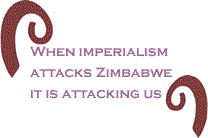 Following
such a lead by “advocates for Africa” is not thinking for
ourselves or fighting the enemies of
Following
such a lead by “advocates for Africa” is not thinking for
ourselves or fighting the enemies of 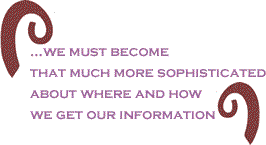

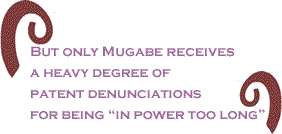 A
little over a year ago, both countries experienced some internal
unrest but not equal consideration by the media or civil society
advocates for
A
little over a year ago, both countries experienced some internal
unrest but not equal consideration by the media or civil society
advocates for 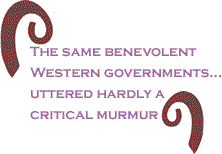 However,
MDC’s Morgan Tsvangirai has publicly declared that if Mugabe
didn’t go peacefully he’d be forced out violently [6]. Five
years ago Tsvangirai was exposed on video through meetings
in London and Montreal, Canada in what was more than likely
a plot to assassinate Mugabe and stage a coup d’état [7].
However,
MDC’s Morgan Tsvangirai has publicly declared that if Mugabe
didn’t go peacefully he’d be forced out violently [6]. Five
years ago Tsvangirai was exposed on video through meetings
in London and Montreal, Canada in what was more than likely
a plot to assassinate Mugabe and stage a coup d’état [7].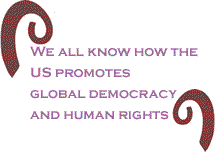

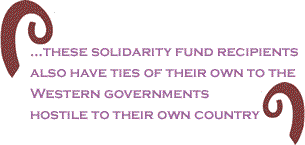 “…the
successes of revolutionary movements in Ethiopia, Angola,
Namibia, Zimbabwe, Grenada, Nicaragua and elsewhere brought
‘cold warrior’ Democrats and ‘internationalist’ Republicans
together to establish in 1979 the American Political Foundation
(APF). The foundation’s task was to study the feasibility
of establishing through legislation a government-financed
foundation to subsidize foreign operations in civil society
through
“…the
successes of revolutionary movements in Ethiopia, Angola,
Namibia, Zimbabwe, Grenada, Nicaragua and elsewhere brought
‘cold warrior’ Democrats and ‘internationalist’ Republicans
together to establish in 1979 the American Political Foundation
(APF). The foundation’s task was to study the feasibility
of establishing through legislation a government-financed
foundation to subsidize foreign operations in civil society
through 
 The
political shenanigans of the MDC have become so embarrassing
and its shameless cooperation with imperialism so overt that
it is a common practice for other anti-Mugabe organizations
to claim distance from them. But this distance can only be
a deception when civil society opposition groups claim not
to be linked to the political opposition, and only engaged
in fostering democratic participation, the mantra of the NED.
Once you call Mugabe a dictator, working to open democratic
space logically becomes the same as working to give Mugabe
and his government the boot.
The
political shenanigans of the MDC have become so embarrassing
and its shameless cooperation with imperialism so overt that
it is a common practice for other anti-Mugabe organizations
to claim distance from them. But this distance can only be
a deception when civil society opposition groups claim not
to be linked to the political opposition, and only engaged
in fostering democratic participation, the mantra of the NED.
Once you call Mugabe a dictator, working to open democratic
space logically becomes the same as working to give Mugabe
and his government the boot.